The Development of the Internet, Research Paper Example
Abstract
This paper provides research into the development of the Internet. In specific terms it addresses the history and origins of the internet, its’ purpose and reason it came into being. How the internet developed from its’ original concepts and ideology, the significant contribution it has made to world communications and the concept of economic and political globalization, how the technology has evolved from origin to present day concepts and finally the future of the internet – where this is headed in terms of technological innovation and future development. The paper answers the critical question of what benefit is the internet to the international community and does this technological innovation pose any threats either now or in the future ?
History and origins of the internet
The Internet evolved in the early 1960s, based upon the work of certain researchers, scientists and engineers who saw the great potential in sharing information and the advantages that computers offered in both the process and speed of handling large volumes of data. It was J.C.R. Lichlider of MIT, who is credited with development of the first network of computer applications. It was then UCLA in 1962 that developed the theory of packet switching to form the basis of Internet connections.
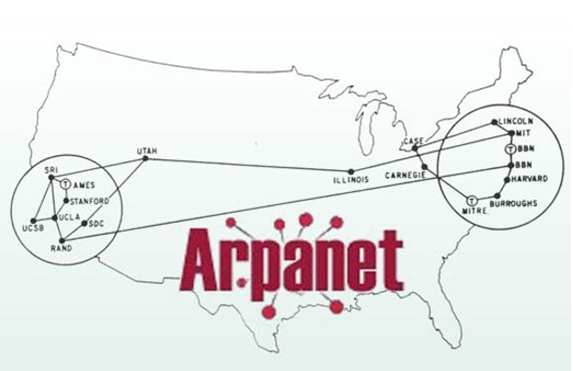
Figure 1 ARPANET the first internet
In the early 1960s, the Internet was then known as ARPANET. [Advanced research projects agency] and connected for major universities i.e. Stamford University, University of Utah, UCSB and UCLA. By June 1970 Harvard, MIT, and STC [systems development Corp.] were added to the network. The network was initially designed in the Cold War to withstand a nuclear attack if one site was not helped. Then routers will direct traffic to alternative sites around the network. The only use is primarily for scientists, researchers, librarians, engineers and computer experts. The Internet further matured to a 1970s, when Bob Kahn and BPM proposed the use of TCP/IP architecture, which received more advanced development at Stanford University. By 1986, the National Science Foundation sponsored further development of the Internet. The breakthrough came in 1991 at the University of Minnesota, who won the debate of developing the Internet through concepts more systems to client server architecture.
In 1994 MIT’s Tim Berners-Lee, formed the World Wide Web Consortium, in order to promote, enhance and develop standards for the Internet. In 1998 the release of Microsoft Windows 98 browser into the Internet was the start of the Microsoft software revolution that integrated desktop applications into the power of the net. This heralded in a period of intense economic growth on the Internet and business’s quickly saw the many advantages that an international communications platform had to offer. More recently, the network has developed beyond solid-state cable technology into wireless platforms creating portals to the Internet in cafés, hotels, airport lounges and through handheld devices. This in turn has resulted in the development of social media sites like Face book, Twitter, Linked in, YouTube etc. The ability for people of all ages to share data and information throughout the world. A truly global network.
The Purpose and reason for the internet
During the early evolution of the net, the main purpose for development was the ability to link computer technology to sophisticated communications protocols. This enabled the quick access and sharing of information between different sites. i.e. , primarily universities, libraries and research institutions. Historically, information had been slow to disseminate and distribute to other interested parties. Computers enabled launch of volumes of information or data to be both stored and processed simultaneously with the ability to share this marks a number of different sites through the communications network. In the early days, this was handled through large mainframe computers. Whilst this had the advantage of fast processing, large storage of data, it was somewhat inefficient in modularity and local processing. This was later resolved with the advent of client/server technology and the ability to create star networks , allowing clusters of smaller high-speed central processing units, thereby providing faster access and retrieval to information.
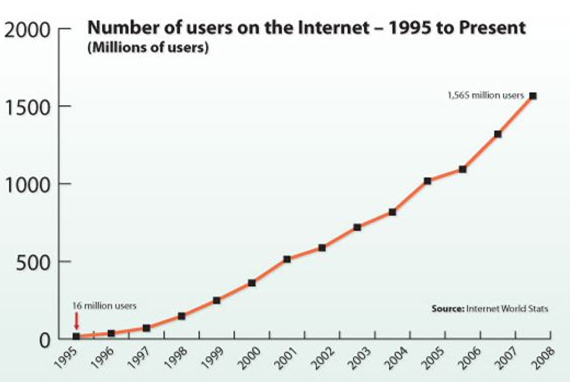
Fig 2 above provides an illustration of the growth of the internet from 1995 to 2008. An amazing development inside 10 years.
A study was conducted into the general personal use of the internet by people and this provides some indicator to the phenomenal growth in this area. ” In summary, to the extent that we can generalize from our sample of 100 households in the Pittsburgh area, we can assume that people’s foremost use for the Internet in 1996 was for pleasure. They used the Internet for entertainment-to enjoy themselves and to obtain more information about their personal interests. They also used it to sustain personal relationships. The most popular use for the Internet outside of the entertainment category was for corresponding by electronic mail, and the bulk of these relationships presumably existed in advance of the Internet’s addition to the household. Finally, a substantial minority of people also used the Internet for work purposes–either for paid employment in the case of adults or for schoolwork in the case of teenagers. ” (Robert Kraut, 2010).
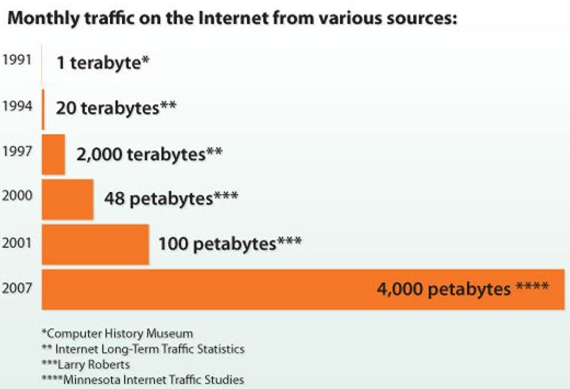
Fig 3 illustrates how the volume of usage on the internet has magnified in the last 10 years of people usage.
Internet contribution to Globalization
One of the largest users of the Internet has been that of e-mail or electronic mail. In recent years this has evolved into text messaging and instant messaging via wireless networks. It now has the ability of being able to communicate messages electronically on a worldwide basis and as such is virtually instantaneous. This has eliminated a large amount of paper in the system, having got rid of the traditional letters and notes. Despite this, people still like to use hardcopy communications e.g., birthday cards and Christmas cards. Personal greeting cards or E. cards are being more widely used by the younger people for communicate messages on handheld devices and personal computers. The affect of social networking sites like Facebook and twitter have enabled people to create their own personal profiles, together with their photograph albums and other information that they wish to share with family and friends. This concept has developed into the use of personal avatars, whereby a person can create their own persona and information for sharing with others, who they may possibly like to date. This virtual world, assimilating into the real world where people meet on the basis of introductions from on-line dating services contained within the framework of the Internet.
The Internet usage has also been instrumental in the development and aid in the teaching of foreign languages i.e., teaching English as a foreign language [TEFL]. Communication software like that of Skype has enabled the computer to combine both voice and image via desktop applications. In order that people may communicate from different locations throughout the world. As such it is possible for an English teacher based in the United States of America to teach a student based in Beijing, China. This elimination of distance has created the concept of a global village and the ability to bridge the cultural divide between nations. Sadly, there does remain a digital divide between that of first world and third world nation’s. The sophistication of the Internet does not reach many Third World countries. They are limited in the sophistication of both hardware and network communication equipment. This inability to keep track with the pace of technological development in the first world places them at a disadvantage in terms of technological advancement and education.
Certain nations like China have limited the power of the Internet to their own people. This deliberate act of intervention being to filter information, or freedom of information contained on the Internet to their own people. The government of China, having decided that too much Western influence will cause discontent and corruption in their society. The concept of the Internet is essentially that of a library, and as such provides the freedom of information to all people of all nations. The medical library has been a particular use in Third World countries and has enabled doctors access to valuable remedial medical advice. The lack of security protocols and restrictions in controlling the Internet also has a dark side. It provides communication portal for terrorists and other insurgents to both share and communicate tactical information. The wireless technology has also been used with handheld devices like cell phones. In order to act as a detonator too improvised explosive devices. The social media software and chat rooms have been utilized by pedophiles in order to lure unsuspecting children to meetings where they are vulnerable to attack or harm. The police Monitor certain criminal elements, but the amount of traffic on the Internet is far too voluminous. In order to make any serious impression.
The future of the internet and technology innovation
The internet is predicted for some phenomenal growth in the next 2 years. As Fig 4 illustrates. We can expect some 1.9 billion users world-wide by 2012 with some 30% of the world population having access to the internet. This will connect some 3 billion people with 1.5 billion of these people having access by mobile devices such as cell phones or i-pads. This creates an online consumer base of some 1 billion people who will be creating a $1.2 trillion industry.
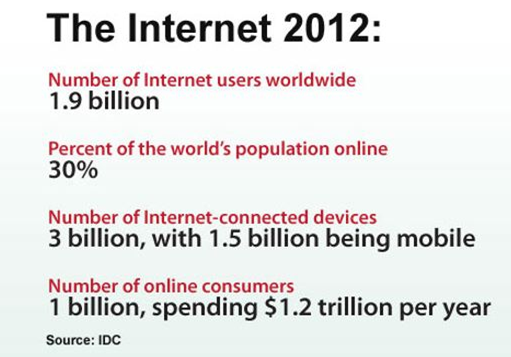
As more controls are built into the internet systems we have the ability to check what people are doing and see what information they both use and access. This can be used in a ‘big brother concept’ and infringes certain human rights. Consider.. ” OnStar car tracking system, designed to help US motorists navigate and get automatic help if needed.
“In the US the FBI required that one of the companies that offered this system reprogram it so they could monitor people they were interested in. “From the FBI’s point of view it’s just a roving bug. But you start to realise the change in the ability of somebody to monitor you.” (Waters, 2008).
Many have stated that the internet is failing as it succumbs to a flood of streaming media from the likes of You Tube and Face book. The fact is that the network is becoming overwhelmed and ultimately may simply collapse due to the amount of usage. Others also paint a bleak future for the internet including that of Prof. Jonathan Zittrain from Oxford University in England – ” its culture of innovation is under threat and we will all be the poorer for it. What makes the internet so valuable, says Zittrain, a professor of internet governance at Oxford University, is its “generative” nature – a handy term that encapsulates its open, anarchic and innovative essence.” (Standage, 2008).
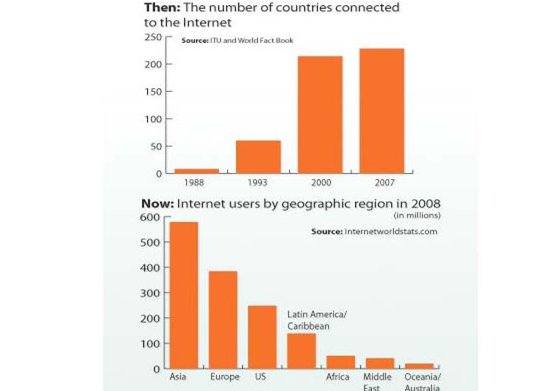
Fig 5 shows the amazing growth of the internet across the different continents in the world – particularly the huge growth in Asia with China and India bringing on a huge user base.
The Internet is generating a huge business economy. With over $1.2 Trillion by the year 2012. The rate of growth is unprecedented and in an area where there are very little checks and balances over the platform it utilizes ” The Internet is making economic activity more efficient, faster, and cheaper, and extending social interaction in unparalleled ways. Increasingly, the largest productivity gains for businesses come from using online networks in some form. The multinational food giant Nestlé, for example, now receives all of its orders directly from supermarkets over the Internet. The shipping company UPS used online networks to optimise its delivery routes, saving 12 million litres of fuel in 2006 from nearly 100 000 trucks.” (Perset, 2008).
The Internet is in essence becoming the `global society. As such, we all rely on the integrity of this service to be maintained by others. If the system is to fail, then it would have enormous economic implications worldwide and in certain countries this could prove disastrous. The way the Internet is developed in the future will impact the rights and choices of those who wish to use it. For example, software applications designed to enable broadband users with high-speed connectivity almost certainly excludes Third World countries. The cost of infrastructure and communications connectivity may mean the higher sophistication of Internet may be confined only to the affluent nations who can afford to use it. By filling the internet with loads of useless clutter it raises the question of whether Social networking sites and gaming sites, should this be stopped in order to allow the Internet to be useful more important applications involving science and medicine.
Online gambling sites whilst generating certain revenues are an example of other usage areas that offer little value to society whilst consuming vast amounts of space and usage tome on the net. These may be equal sites for potential closure in the event that capacity issue become an issue in the future.
Economic and Political implications of the Internet
The Table in Fig 6 indicates the economic implications for e-commerce sales in the USA. The statistics clearly shows the huge rise in computer based transactions over the internet between the period of 2000-2008. Hence the importance of the internet in terms of economic growth and business in the USA.
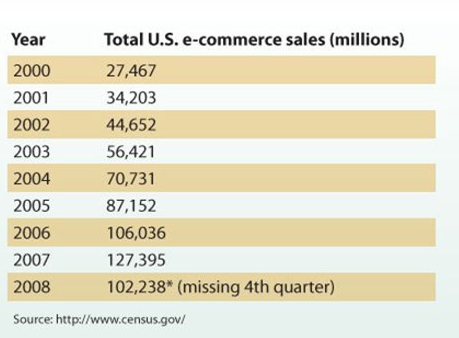
Internet advertising has been said to account for some $300 billion of economic development in the USA. This is considered to represent about 2.1% to the USA Chris domestic product and involves the deployment of some 1.2 million Americans or 1.9 million people who are involved in direct Internet support related jobs. Study being conducted by the Harvard University professor’s job data. John Welch. Study concluded that the Internet has become an integral part of the social well-being and economic life of America. Further facilitates the rapid flow of information between US businesses, thereby creating increased prosperity for US business. ” Further, public policy toward the Internet has largely been defined by the absence of central planning. Perhaps as a consequence, there is little information on the scope and scale of the Internet resource. A second contribution of this report is to map the firms associated with the Internet and to identify the economic and social benefits that flow from it.” (Interactve Advertising Bureau, 2008).
Professors Welch and Deighton went on to determine that Internet advertising and marketing has been a source of inspiration and wealth for both small business and government departments / institutions. For example : ” Small businesses have thrived as a result of the Internet: There are more than 20,000 Internet-related small businesses in the U.S. that provide a variety of services such as web hosting, ISP services, web design, publishing, and Internet-based software consulting. Many of these businesses have 10 or fewer employees. Internet-related employment is particularly important to certain areas of the country but exists in every one of the 435 U.S. Congressional Districts. Some Congressional Districts have more than 6,000 Internet-related employees.” (Interactve Advertising Bureau, 2008).
The Internet Society produced an interesting doctrine for the use and availability of the internet ” The Internet Society’s Public Policy Principles and activities are based upon a fundamental belief that the Internet is for everyone. We envision a future in which people in all parts of the world can use the Internet to improve their quality of life because standards, technologies, business practices, and government policies sustain an open and universally accessible platform for innovation, creativity, and economic opportunity. ” (The Internet Society, 2010). Nevertheless, the internet remains largely unregulated and policed as it passes through different international jurisdictions and boundaries. For example the use of the internet may have very different applications and standards in the USA ( fairly regulated) to that of China ( strictly regulated) to that of Africa (unregulated).
Conclusion
The Internet provides tremendous benefit to society in terms of communications, social interaction, the acquisition and development of knowledge sharing, interacting with other cultures in a global society. It also can provide the danger of confusion with a virtual world and that of reality. Used for the purpose of good it may be classified as an asset. It also has a dark side where it provides technology in order to support drug cartels, terrorism and paedophiles. On balance the advantages most likely outweigh the disadvantages and equally we cannot prevent technological advancement and advancement. It is questionable as to whether we make good use of this gift of technology and social sites may be deemed as a waste of good space, particularly where the bandwidth may be put to better use in terms of supporting research, science and medicine i.e. some of the original concepts that it was designed for. The use of Avatars may be a way of masking social reality and there is the danger that we lose valuable social skills by hiding within a cyber virtual reality.
Works Cited
Interactve Advertising Bureau. (2008). Economic Value of the Advertising-Supported Internet Ecosystem. Retrieved 6 22, 2010, from Interactve Advertising Bureau: http://www.iab.net/insights_research/947883/economicvalue
Perset, K. (2008). The Future. OECD. Paris: OECD.
Robert Kraut, V. L. (2010). Why People Use the Internet. Retrieved 6 22, 2010, from Carnegie Mellon University: http://homenet.hcii.cs.cmu.edu/progress/purpose.html
Standage, T. (2008, 4 27). The Future of the Internet: And How to Stop It by Jonathan Zittrain. Retrieved 6 22, 2010, from Sunday Times: http://entertainment.timesonline.co.uk/tol/arts_and_entertainment/books/non-fiction/article3806571.ece
The Internet Society. (2010). Principles. Retrieved 6 22, 2010, from The Internet Society: http://www.isoc.org/pubpolpillar/principles.shtml
Waters, D. (2008, 4 24). Stark warning for internet’s future . Retrieved 6 22, 2010, from BBC News: http://news.bbc.co.uk/2/hi/technology/7364901.stm

Time is precious
don’t waste it!

Plagiarism-free
guarantee

Privacy
guarantee

Secure
checkout

Money back
guarantee






